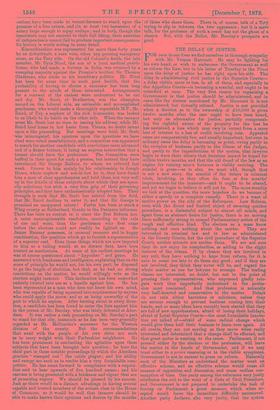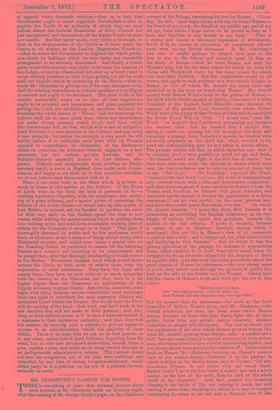of appeals wants thorough revision,—that is, in fact, that Government
ought to recast Appellate Jurisdiction,—that is, deprive the Lords of an authority of which they are most jealous, absorb the Judicial Committee of Privy Council but just reorganised, and reconstitute all the higher Courts on some new model. Another party wants, very justly, a thorough re- form in the arrangements of the Courts as to time, wants the Courts to sit always as the London Magistrates' Courts do, —that is, wants the Government to frighten the whole profes- sion about its holidays, which are sure under any reasonable arrangement to be seriously diminished. And finally, a fourth party wants Government, very justly, to increase the number of the Judges, so that an illness shall not shut up a Court ; and to revise retiring pensions, so that Judges getting too old for work shall not impede justice by remaining on the Bench,—that is, wants Mr. Gladstone to give up one of his very strongest views, that the existing expenditure on judicial machinery is profligate in amount and ought to be decreased. The plain truth of the matter, meanwhile, seems to be that all four suggestions ought to be accepted and harmonised, and plans prepared for getting the Codes, for establishing an appellate tribunal, for recasting the whole system of "Terms," and for increasing the judicial staff, all at once, plans from which any Government not under strong pressure would recoil, and from which this Government will, we fear, shrink with a sort of antipathy, Lord Selborne is a new member of the Cabinet, and may bring it new strength ; but unless the strength is very great, he will hardly induce it to undertake such tasks with its Premier opposed to expenditure, its Chancellor of the Exchequer intent on reduction, its Attorney-General engaged on a new mortmain law and endless private business, and its Solicitor-General markedly hostile to Law Reform alto- gether. Difficult and disagreeable work, yielding no Parlia- mentary result, is never in England done under such circum- stances, and happy as we shall be to find ourselves mistaken, we do not believe that Government will do it.
There is one other body in the State which is at least as much to blame in this matter as the Cabinet. If the House of Lords were in the least the body it pretends to be—a working legislative Chamber, with the experience and autho- rity of a great tribunal, and a special power of correcting the failures of the Lower House—it would take up this matter of Law Reform in earnest, ask its Speaker to produce the need- ful Bills very early in the Session, spend the time it now wastes while waiting for measures from below in putting them into working order, and send down a complete working plan of reform for the Commons to accept or to reject. That plan, if thoroughly discussed in public and by the profession, would have, at all events, as fair a chance of being carried as any other Ministerial measure, and might even, under a special vote on the Standing Orders, be permitted to remain till the following Session as a remand, not requiring to be reintroduced, and be passed then, after the thorough overhauling it would receive in the Recess. We cannot imagine work which would better become the Lords, or tend more to relieve them from the imputation of utter uselessness. They have the legal skill among them, they have on such subjects as much sympathy with the country as the Commons, and they have in a far higher degree than the Commons an appreciation of the dignity necessary to great Courts. Any reform, moreover, must begin with them, because anyone conceivable must terminate their own right to constitute the most expensive dilatory and undecided Court within the Empire. But we all know the Peers will do nothing of the kind ; that work, real hard work, is the one sacrifice they will not make to their position ; that they cling to their judicial power as if it were a buttress instead of a weakness to their legislative authority ; and that they will not consent, by carrying such a scheme, to give an apparent success to an administration which the majority of them dislike. There is no hope that we can see in that quarter, or in any other, unless indeed Lord Selborne, departing from his usual, but in this case misplaced moderation, should frame a plan, explain a plan, and insist on its being carried through as an indispensable administrative reform. The Cabinet would not face his resignation, nor, if his plan were sufficient and unspoiled by any idea of saving twopence-halfpenny, would either party be in a position, on the eve of a general election, seriously to resist.



































 Previous page
Previous page